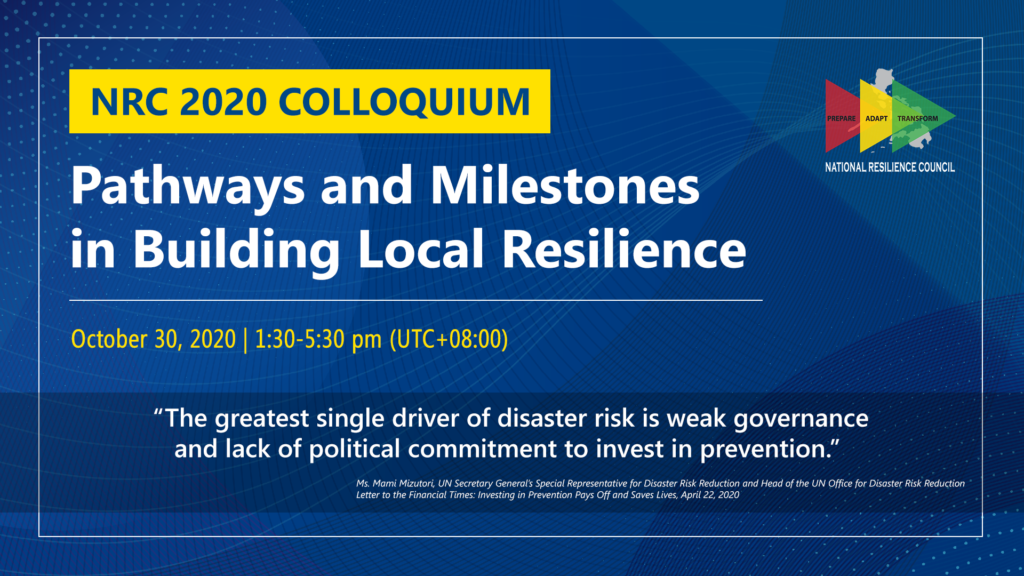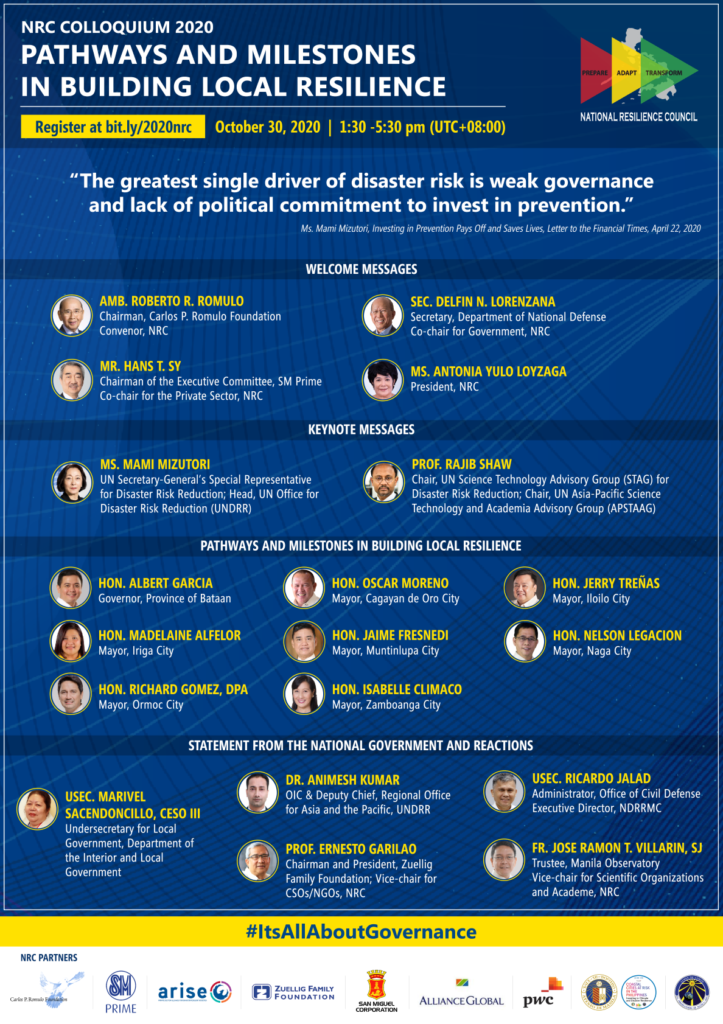
Theme: “Pathways and Milestones in Building Local Resilience“
CONTEXT:
Crises and disasters are disruptions that cause challenges to governance. In these rapidly changing times, more adaptive and transformative leadership is required to reduce risk to new hazards and change the course and nature of exposure and vulnerability. Traditional local leadership must broaden its reach in order to address the challenges of disaster prevention, mitigation, response, and recovery in development planning, rather than just in preparedness for emergency response.
Promoting a climate and disaster resilient Philippines through effective and transformative leadership is at the core of NRC’s institutional purpose. Thus, its work highlights the crucial role local leaders play in reducing existing risk and preventing new risk from being generated by moving science into both policy and action.
As all risk is local, NRC and its partners build technical capacities of local government units and their stakeholders by co-creating new knowledge on risk, and by training them in evidence-informed leadership and governance for resilience.
The COVID-19 pandemic has introduced new complexity and uncertainty to the pathways towards resilient development. It has highlighted the critical need for multi-stakeholder collaboration based on scientific knowledge and has imbued the role of local governments with even greater nuance and importance. Long-standing issues on equity and governance are reflected in the differentiated impacts of the pandemic on communities. These now call for a fundamental shift toward science-based, risk-informed and resilience-driven planning and development.
THE COLLOQUIUM 2020:
The NRC, by virtue of its mandate and vision, engages local government units in making resilience their priority by fostering knowledge-based enabling environments for evidence informed risk governance.
This colloquium officially closes the Year 1 PREPARE Phase of the Resilient Local Government Units Program and marks the transition of LGU partners to the Year 2 ADAPT Phase. It is an opportunity for local government leaders and their respective Resilience Councils to share their accomplishments and milestones relative to the Resilience Scorecard and roadmap as well as their learnings and insights through the lens of their leadership journeys as captured in their leaders’ public narratives. They will highlight performance and risk assessments, capacity and competency development, and the formation of strategic partnerships to address unique and emerging challenges of building institutional capacity to contain and mitigate the public health crisis in the face of other natural hazards.
The NRC Colloquium 2020 is likewise focused on the leadership journeys of each of NRC’s partner local chief executives in building local government resilience. Their experiences and rationale for their acts of leadership; good practices; and strategies, future plans, challenges, and lessons learned will be shared during this event. These constitute their first year in a continuing journey of ownership, co-ownership, and co-creation and highlight learning and insights gained from the application of knowledge, skill, and abilities in the course of the program’s implementation.
Finally, NRC will share its responses to the challenges of applying the Resilience Framework and implementing the program’s Prepare, Adapt, and Transform model. Learnings in the PREPARE year have been evaluated against the additional risk posed by the emergence of a new and unpredictable biological hazard. As NRC transitions to the ADAPT year, it will highlight the application of a systems approach to risk reduction and the responsiveness of the program design. It will likewise re-emphasize the critical need and importance of building multi-stakeholder partnerships and the institutionalization of trans-disciplinary learning and knowledge-management to inform investments in resilient development.

Opening Remarks
Ms. Antonia Yulo Loyzaga, NRC President
Welcome Message
Amb. Roberto R. Romulo, NRC Convenor and Chairman, Carlos P. Romulo Foundation
Welcome Message
Sec. Delfin Lorenzana, NRC Co-chair for Government and Secretary, Department of National Defense
Welcome Message
Mr. Hans Sy, NRC Co-chair for the Private Sector and Co-chair, ARISE Philippines
Keynote Message
Ms. Mami Mizutori, UN Secretary General’s Special Representative for Disaster Risk Reduction and Head of UNDRR
Keynote Message
Dr. Rajib Shaw, Chair, UN Science Technology Advisory Group (STAG) for DRR and Chair, UN Asia-Pacific Science Technology and Academia Advisory Group (APSTAAG)
Cagayan de Oro City
Investing in Knowledge Sharing and Action Research for Evidence-informed Risk Governance
Ormoc City
Building City Resilience through Participatory Governance
Naga City
Integrating Disaster and Climate Risk into Strategic Investments
Iloilo City
Delivering Shared Value to Enhance Whole-of-Society Engagement for Resilience
Muntinlupa City
Optimizing Digital Tools for Pandemic Resilience at the Community Level
Iriga City
Building Local Resilience through Transformative Leadership
Zamboanga City
Ensuring Public Health and Human Security through Evidence-informed Risk Governance
Province of Bataan
Bouncing Forward: Leadership for Resilient Human Development and Inclusive Economic Growth
Statement from the National Government
Usec. Marivel Sacendoncillo, Undersecretary for Local Government, Department of the Interior and Local Government
Reaction
Dr. Animesh Kumar, OIC and Deputy Chief, UNDRR Regional Office for Asia and the Pacific
Reaction
Dir. Tecson Lim, Director III, Policy Development and Planning Service, Office of Civil Defense
Reaction
Fr. Jose Ramon Villarin, SJ, NRC Co-chair for Scientific Organizations and Academe and Trustee, Manila Observatory
Reaction
Prof. Ernesto Garilao, NRC Co-chair for CSOs/NGOs and Chairman and President, Zuellig Family Foundation
Synthesis
Ms. Antonia Yulo Loyzaga
Closing Remarks
Ms. Mami Mizutori